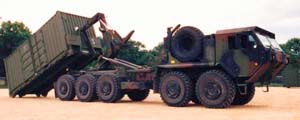Articles >>
Oshkosh Truck Unveils Next Generation of Unmanned Defense Logistics Vehicle
Category: Robots

OSHKOSH, Wis., -- Oshkosh Truck Corporation announced that it has unveiled an unmanned version of its Palletized Load System (PLS) vehicle at the U.S. Army Tactical Wheeled Vehicle Component Technology Demonstrations in Yuma, Ariz. Showcasing the immediate application of the technology for the U.S. Army fleet, Oshkosh is demonstrating a real-world mission scenario as the driverless truck transports cargo between destinations seven miles apart in the Arizona desert. The unmanned navigational kit being applied to the PLS was tested at the 2004 and 2005 DARPA Grand Challenge races, and has undergone additional testing in desert environments, similar to those in the Middle East. Oshkosh is partnered with Rockwell Collins and the University of Parma, Italy, on the development this unmanned navigational kit. "It is Oshkosh Truck's objective to always support the U.S. Army's drive to integrate the most capable and reliable technologies into their fleet. To that end, we're proud to make this next-generation of unmanned technology a reality that could be applied within the near term," said John Stoddart, Oshkosh executive vice president and president of defense. "Our technology allows soldiers to be taken out of convoy resupply missions or to be re-assigned to other tasks within the convoy." The current "manned" Oshkosh(R) PLS transportation vehicle has proven its ability in front-line supply missions in Bosnia, Kosovo, Afghanistan and Iraq. A 10-wheel-drive truck and trailer system, the PLS is designed to transport containers carrying ammunition and other critical supplies, or large tanks holding fuel or water. The original PLS and the PLS Unmanned Ground Vehicle have a 16.5 ton payload capacity and an on-board material handling system that quickly unloads and loads cargo. "Having helped the United States military move people and supplies for more than 80 years, Oshkosh understands the needs and challenges facing the armed services and are committed to helping the United States military lead the way in realizing the benefits of autonomous vehicle technology," said Stoddart. "I believe this technology can revolutionize the transport of logistics in future conflicts and contribute to increased soldier survivability." |
Oshkosh Truck |
Oshkosh Truck to Build MRAP II Test Vehicles under New Contract Award
21.12.2007
Discuss
